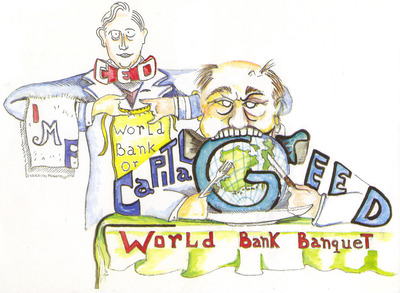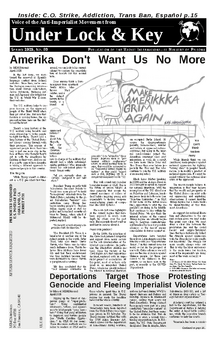
Imperialism and Neo-Colonialism is Killing one of Africa's Biggest Economies

Nigeria, Africa’s most populace nation and one of its most productive economies is currently facing an economic crisis. The masses of Nigerians cannot afford groceries or other essential products. The country’s government has failed to remedy the situation with minuscule economic reforms. These reforms were controversial and many working class people and groups protested and resisted them for sometime prior to their eventual implementation. Despite recent periods of economic growth, inflation in Nigeria has soared to 34% rendering one of the government’s reforms (raised minimum wage) obsolete.
In December 2024 local police in Ibadan say that at least sixty people have died in stampedes. These stampedes occurred at three different charity events where organizations were giving out food and cash donations. In Ibadan, a charity event for children was held and thousands of people showed up with their kids, a lot of them were days early in order to receive the much needed essential products. Tempers flared as people became desperate for these donations and the stampede ignited. In the end at least thirty-five children died in Ibadan that day. It is safe to say that capitalist imperialism was party to their deaths.
These stampedes merely demonstrate the struggles and desperation people of Nigeria are facing. The underlying causes of the economic situation in Nigeria is that the imperialist controlled General Bank placed inflation at 34%, and in order to minimize the effects of that high inflation rate the Nigerian government began to implement the reforms I have already mentioned. Western imperialist institutions and countries largely praised these reforms before and at the outset of their implementation. These institutions include the International Monetary Fund, as well as the United States government. Meawnwhile, U.$. officials are working hard to get inflation back to around 3% for Amerikans, in a country where most people are in the top 10% income-wise in the world. The proletariat and lumpen proletariat in Nigeria as well as the small peasantry are suffering greatly compared to Amerikans complaining about gas prices for their 15 mile per gallon trucks they drive to Costco and load up on bulk foods.
As part of the reforms the Nigerian government devalued their national currency (Naira) making themselves more dependent upon the whims of foreign international economic interests and activities. These activities rarely favor African or other Third World countries. The Nigerian government also cut their electricity subsidies, and probably the most important reform being the ending of their fuel subsidy which is one of the benefits that Nigerians receive. While gasoline was slightly cheaper in Nigeria in December 2024 ($0.67/Liter) than in the United $tates ($0.80/Liter), minimum wages in Nigeria were around $42 per month. That’s less than an Amerikan making minimum wage earns in an 8-hour day!
Previous governments have attempted to end the fuel subsidy but backed down repeatedly as a result of huge protests from the Nigerian people. The current and former governments set their sights on this particular subsidy because it was a very expensive one for the government, adding to government budget issues. The effects of cutting the subsidy for fuel saw the price of fuel, and subsequently transportation have soared. The latter makes it more expensive for corporations and businesses to perform their logistical duties, and they therefore raise their prices for consumers. Also because of power cuts people in Nigeria rely heavily on power generators and the cost of these have gone up as well.
The Nigerian people are angry at the failure of the Nigerian government to put comprehensive economic measures in place to soften the blow of the removal of the fuel subsidy, their inability to do so showcases their incompetence. The government has asked for the people’s patience, and have expressed that they are aware of the economic pain this is causing, but that is is necessary and temporary. As I have mentioned they have risen the minimum wage and made it almost double what it was previously. However, inflation has made such measures void. The government has also done small cash grants to the poorest socioeconomic sectors of Nigerians. The people have a general feeling that the political class in Nigeria do not really comprehend the effects these economic policies are having on their day to day lives.
The writer believes that the government comprehends perfectly well, however they are more concerned with maintaining exploitative relations with the United States and its corporations along with those of other imperialists.
Down With Imperialism!!!!








